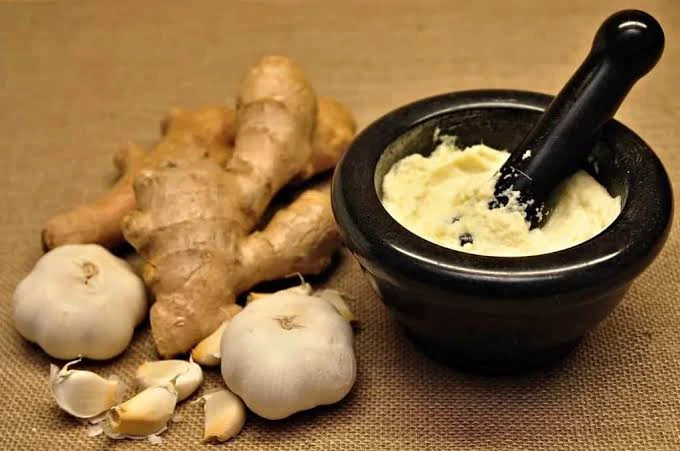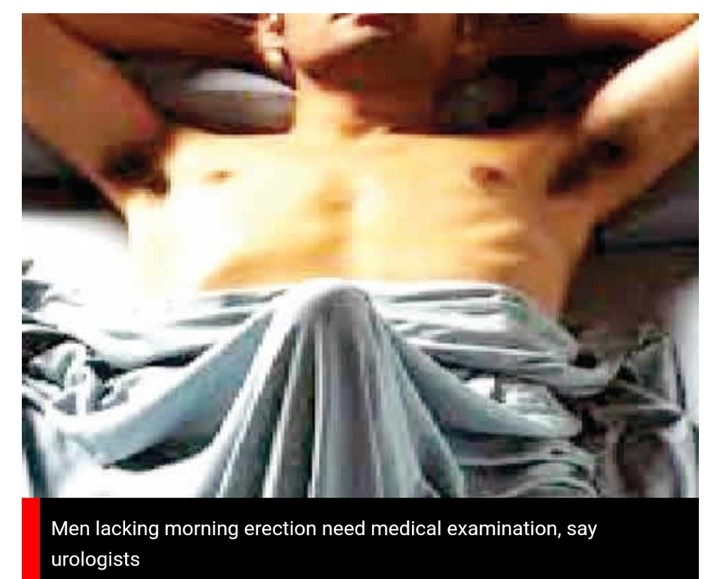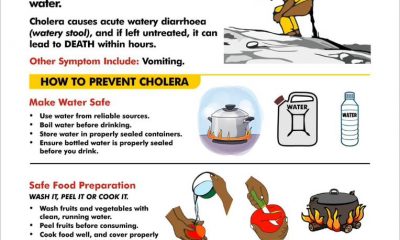Health/Beauty
People Who Should Not Eat Garlic and Ginger Together to Avoid Side Effects

People Who Should Not Eat Garlic and Ginger Together to Avoid Side Effects
Sahara Weekly Reports That Garlic and ginger are two commonly used ingredients in various culinary traditions worldwide due to their incredible health benefits and distinctive flavors. These potent herbs are often combined to enhance the taste and nutritional value of dishes. However, while garlic and ginger offer numerous advantages to our overall wellbeing, there are certain sets of people who should exercise caution and avoid consuming them together to prevent potential side effects. In this article which is in accordance to healthline, we will delve into these various groups and explore the reasons behind their exclusion.
Before we delve into the specific categories of individuals who should refrain from consuming garlic and ginger together, it is essential to understand the myriad health benefits that both these ingredients offer when consumed separately.
Garlic, with its characteristic pungent aroma, contains a compound called allicin, which has antimicrobial, anti-inflammatory, and antioxidant properties. It has been reported to lower cholesterol levels, reduce blood pressure, strengthen the immune system, and even help prevent certain types of cancer. Additionally, garlic is believed to improve cardiovascular health, boost liver function, and aid digestion.
Similarly, ginger, with its warm and spicy undertones, boasts an array of health benefits. It contains gingerol, a powerful anti-inflammatory compound, known for its ability to reduce pain and nausea, boost digestion, and mitigate the symptoms of various illnesses, including the common cold and flu. Ginger has also been linked to improved blood circulation, reduced menstrual pain, and lower cholesterol levels.
While both garlic and ginger offer an extensive range of health benefits individually, combining them can lead to unwanted side effects, especially for certain groups of people. Let us explore each of these groups and their reasons for avoiding the consumption of garlic and ginger together.
1. Individuals with Stomach Ulcers:
People with stomach ulcers or gastric disorders should avoid combining garlic and ginger. Both herbs have potent properties that can increase stomach acid secretion, which can exacerbate the symptoms of ulcers, causing irritation, pain, and discomfort. It is advisable for these individuals to either consume these ingredients in moderation or seek alternative remedies.
2. Individuals with Bleeding Disorders:
Garlic has been known to have a mild blood-thinning effect due to its compound, allicin. It may interfere with blood clotting and could pose potential risks to individuals with bleeding disorders or those scheduled for surgery. Ginger, on the other hand, acts as a mild blood thinner as well, further enhancing the risk of excessive bleeding. Therefore, individuals in these categories should refrain from consuming garlic and ginger together to prevent any unwanted complications.
3. Individuals Taking Blood-Thinning Medication:
Similar to individuals with bleeding disorders, people who are taking blood-thinning medication such as warfarin should avoid the combination of garlic and ginger. These medications work by inhibiting blood clotting, and consuming garlic or ginger can potentially amplify their effects, leading to increased bleeding risks.
4. Individuals with Gastrointestinal Disorders:
Garlic and ginger can stimulate the gastrointestinal system, promoting digestion and alleviating symptoms of bloating and flatulence. However, for individuals with gastrointestinal disorders such as gastroesophageal reflux disease (GERD) or irritable bowel syndrome (IBS), these effects may be undesirable. The consumption of garlic and ginger together can trigger acid reflux, heartburn, and increase bowel sensitivity, worsening the symptoms.
5. Individuals with Low Blood Pressure:
Both garlic and ginger have been reported to lower blood pressure. Therefore, individuals with already low blood pressure, or hypotension, should be cautious when consuming these ingredients together, as it can potentially cause a further drop in their blood pressure levels, leading to dizziness, fainting, or fatigue.
6. Individuals Preparing for Surgery:
Individuals who are scheduled for surgery should avoid consuming garlic and ginger together. Garlic is known to have antiplatelet properties, which can interfere with blood clotting during and after surgery, resulting in excessive bleeding. Ginger exacerbates this effect, further increasing the risks associated with surgical procedures. To ensure a smooth surgical experience, it is advised to abstain from consuming these herbs a few weeks before the scheduled surgery.
7. Individuals with Allergic Reactions:
Although relatively rare, some individuals may develop allergic reactions to garlic and ginger. These reactions can vary in severity and may manifest as skin rashes, itching, swelling, or difficulty in breathing. If an individual has experienced past allergic reactions to either garlic or ginger, it is prudent to exercise caution and avoid consuming them together.
It is worth mentioning that while these categories of people should refrain from consuming garlic and ginger together, both herbs have extensive health benefits when consumed separately. Therefore, it may be beneficial for individuals in these groups to enjoy the benefits of garlic and ginger separately to reap their respective advantages without potential side effects.
Garlic and ginger are two powerful ingredients that offer numerous health benefits. However, their combination may not be suitable for everyone. Individuals with stomach ulcers, bleeding disorders, those taking blood-thinning medication, gastrointestinal disorders, low blood pressure, individuals preparing for surgery, and those with allergic reactions should refrain from consuming garlic and ginger together to prevent unwanted side effects. As with any health consideration, it is always recommended to consult with a healthcare professional or nutritionist for personalized advice and guidance.
Fashion/Lifestyle
Introducing “Atupaglowco” : Where Fragrance Meets Feeling; The Story of Our Beginning

Introducing “Atupaglowco”: Where Fragrance Meets Feeling; The Story of Our Beginning
Every great journey begins with a sense of anticipation. For us, it began with a simple belief that a space should do more than exist, it should speak comfort and glow.
In a world filled with noise, stress, and endless motion, we realized something powerful. Fragrance can transform not just rooms, but moods. A familiar scent can calm anxiety. A warm aroma can turn a house into a home. A gentle glow can bring peace after a long day. This realization gave birth to “Atupaglowco.”
Atupaglowco was not created to sell diffusers, room sprays, or candles. It was created to create experiences. To create moments. To create atmospheres where people can breathe, reflect, and feel whole again.
The name itself represents more than a brand. It represents warmth. It represents light. It represents presence. We remember the early days, the planning, the testing of scents, the moments of doubt, and the moments of excitement. Each candle poured was a step of faith. Each fragrance blended was a piece of our vision coming to life. We weren’t just building products; we were building something meaningful.
Our diffusers were designed to quietly fill spaces with elegance.
Our room sprays were crafted to instantly refresh and revive environments. Our candles were made to bring calm, beauty, and a soft glow into everyday life.
Atupaglowco was born from passion, patience, and purpose. This launch is not just the start of a business. It is the start of a movement to help people create spaces they love. Spaces that inspire rest. Spaces that inspire joy. Spaces that glow.
We believe fragrance is personal. We believe glow is emotional. We believe every space deserves both.
Today, we proudly introduce Atupaglowco to the world.
This is only the beginning.
Health/Beauty
Transforming Healthcare: RapidHeal Nigeria Offers Job Opportunities for 100 Certified Nurses Nationwide

Transforming Healthcare: RapidHeal Nigeria Offers Job Opportunities for 100 Certified Nurses Nationwide
Health/Beauty
Why Men Without Morning Erection Need Help

Why Men Without Morning Erection Need Help
Male reproductive health experts have urged men to take their sexual health seriously by seeking medical evaluation if they are not experiencing morning erections, a common and natural occurrence in healthy men.
The urologists stated that men experiencing persistent erectile issues or concerns should consult a healthcare professional for personalised evaluation and guidance.
Speaking exclusively with PUNCH Healthwise, the physicians advised men not having morning erections to carry out a comprehensive health assessment, including hormone testing, semen analysis, and lifestyle evaluations, to determine the underlying causes which may be erectile dysfunction or infertility.
According to Healthline, morning erections, a natural occurrence in most men, are often seen as a sign of healthy sexual function. They are typically caused by increased blood flow and hormonal fluctuations during the rapid eye movement (REM) phase of sleep.
The health website, however, noted that a notable number of men have reported experiencing a lack of morning erections, raising concerns about potential fertility or sexual health problems.
While some experts suggested that the absence of morning erection could be linked to underlying health issues, including infertility, others argued that it is not a reliable indicator of reproductive health.
A consultant urologist, Dr Emmanuel Eze stated that the body’s ability to have regular morning erections may be a reflection of broader reproductive health.
The physician stressed that the absence of morning erections could signal problems with hormone levels, such as low testosterone, or vascular health, which could affect overall erectile function and, in some cases, fertility.
Eze emphasised that morning erection is a natural occurrence during the REM sleep stage, typically happening 3-5 times per night.
The physician explained that the absence of morning erections could suggest issues such as erectile dysfunction, low testosterone levels, or underlying cardiovascular conditions.
According to him, it is normal for men to experience morning erections three to five times each night. These erections are typically spontaneous and occur without sexual arousal. The process is part of the body’s natural hormonal fluctuations and is linked to the functioning of the nervous system and blood flow.
Eze explained that these spontaneous erections during sleep are crucial in maintaining healthy erectile function and, by extension, overall reproductive health.
He emphasised that they are a natural and healthy sign of the body’s ability to achieve and maintain erections, which are important for male fertility.
“While occasional changes in morning erections are normal as men age, a persistent lack of them could point to potential health problems such as erectile dysfunction, low testosterone, or even more serious conditions like heart disease. Men mustn’t ignore these early warning signs.
“A comprehensive evaluation can help pinpoint the cause and allow for timely treatment options, whether it’s lifestyle changes, therapy, or medications,” Eze added.
Speaking further, the urologist elaborated that the absence of morning erections could be an indication of various medical conditions that might impact sexual and reproductive health.
“Erectile dysfunction is often the result of an imbalance in the body’s ability to deliver blood to the penis. If morning erections are absent, it could be a reflection of poor blood flow or nerve function, which are key contributors to erectile dysfunction,” Eze explained.
In addition to erectile dysfunction, the male reproductive expert noted that the absence of morning erections may also be linked to low testosterone levels.
He added, “Testosterone is the primary male sex hormone, essential for sexual function, mood regulation, and the production of sperm. A decline in testosterone can lead to a reduced frequency of morning erections. It can also cause a range of other symptoms, such as fatigue, decreased libido, and loss of muscle mass. While a decrease in testosterone levels is a natural part of aging, significant drops in testosterone could signal more serious health concerns.”
Eze also underscored the connection between erectile function and male fertility, stressing that problems with achieving or maintaining an erection could affect a man’s ability to conceive.
He explained that erectile function plays a critical role in sperm delivery, and when erectile issues arise, they could make it more difficult to engage in regular sexual activity, which could impact fertility.
“There is a direct connection between erectile function and male fertility. If a man is consistently not experiencing morning erections, it could indicate that there’s an issue with his reproductive system, whether it’s a problem with his hormones, blood vessels, or nerve function,” he said.
He pointed out that while the absence of morning erections does not automatically equate to infertility, it could signal underlying problems that should be addressed.
Eze advised that men who notice a persistent absence of morning erections should consult a urologist for an evaluation of their reproductive and sexual health.
He explained that poor blood circulation, which is often associated with heart disease or high blood pressure, can directly affect the ability to achieve erections.
“The vessels that supply blood to the penis are small and delicate, and when these vessels are compromised due to poor cardiovascular health, it can result in a decreased ability to have spontaneous erections.
“Erectile dysfunction is frequently one of the early signs of cardiovascular problems. If a man is not having morning erections, it could be a sign that his vascular health is not in optimal condition. It’s essential to recognise this as a potential red flag and seek medical advice before the issue becomes more severe,” the urologist warned.
However, a Senior Registrar in Urology at the Lagos State University Teaching Hospital, Dr. Akpo Edewor, argued that the lack of a morning erection is not necessarily an indication of serious health concerns, as many people assume.
Edewor emphasised that the absence of morning erections is not an automatic sign of erectile dysfunction or serious sexual health problems.
He explained, “Morning erections should not be viewed as the definitive measure of sexual health. It is important to understand that men can still maintain erectile function despite not having morning erections. This does not immediately indicate erectile dysfunction.”
The urologist stressed that various factors, such as sleep patterns, stress, or even the time a man wakes up, can influence whether or not he experiences a morning erection.
He further clarified that a key component in assessing erectile health is the ability to achieve an erection in response to sexual stimuli.
“If a man can still attain an erection when engaging with a partner, even without morning erections, this indicates that his erectile function is likely intact,” he stated.
Erectile dysfunction, according to Edewor, is more complex than just the absence of morning erections. It is a condition where a man consistently struggles to achieve or maintain an erection sufficient for sexual intercourse.
He said various health conditions, including heart disease, diabetes, hypertension, and even the medications used to treat these conditions, could contribute to erectile dysfunction.
-

 celebrity radar - gossips6 months ago
celebrity radar - gossips6 months agoWhy Babangida’s Hilltop Home Became Nigeria’s Political “Mecca”
-

 society6 months ago
society6 months agoPower is a Loan, Not a Possession: The Sacred Duty of Planting People
-

 society5 months ago
society5 months agoReligion: Africa’s Oldest Weapon of Enslavement and the Forgotten Truth
-

 news6 months ago
news6 months agoTHE APPOINTMENT OF WASIU AYINDE BY THE FEDERAL GOVERNMENT AS AN AMBASSADOR SOUNDS EMBARRASSING








